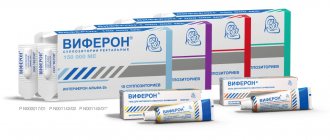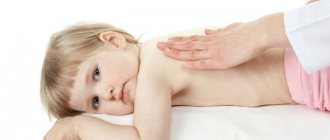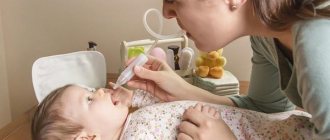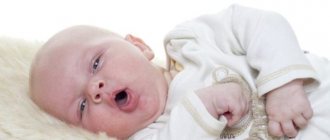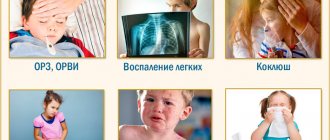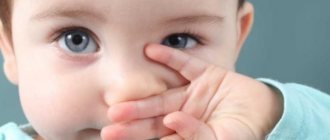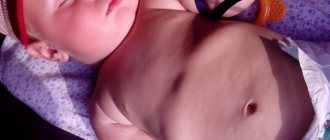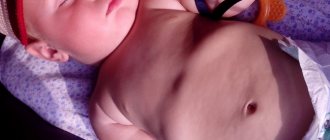Causes of cough
Coughing in an infant is a way to remove obstructions to breathing. For small children it can be different:
- physiological nature;
- viral;
- non-infectious.
Cough of physiological nature
Infants do not have a developed mechanism for removing mucus that forms in the respiratory organs. To clear the passages, the child coughs.
A healthy baby coughs up to ten times a day. Doctors call this cough physiological; it does not require treatment. But only a doctor can determine the nature of the cough, including physiological.
Non-infectious cough
The baby has not yet learned to live in the outside world, to dry air, irritating impurities in it, especially in winter.
A baby coughs as a result of:
- allergies;
- dry air ;
- an object that has entered the respiratory system from the outside.
♀ If this symptom appears as a result of an allergic factor, you need to contact a pulmonologist-allergist. In this case, you cannot self-medicate.
If your baby coughs due to dry air, humidification with special devices or wet cleaning will help ease breathing.
♂ Cough may occur when milk or saliva is inhaled. It appears due to weakness of the respiratory tract muscles or when trying to remove a foreign object.
Infectious cough
☝️ The reason for the baby’s cough is caused by ARVI, a viral cold. The baby breathes through his mouth, and this leads to drying out of the mucous tissues of the larynx. Snot flows along the walls of the nasopharynx into the respiratory organs, irritating their mucous membranes, causing a cough reflex.
A similar effect causes otitis media.
Types of cough
There are two types of cough syndrome: dry and wet.
Dry
It usually occurs with viral diseases, and is very similar to barking syndrome, with whooping cough, for example. After infection with the virus, a child first develops a dry cough without fever, and after a few hours all the symptoms of ARVI are already evident. This is due to irritation of the walls of the respiratory organs. ♨️ Dry nature effect occurs during asthma or allergy attacks. A two-month-old baby, a month-old baby or a newborn often coughs when feeding if mother's milk gets into the larynx. They still don’t know how to eat properly.
Wet
Appears when sputum forms on the surface of the mucous membrane. Its departure clears the passages, after which the baby recovers. The color of the mucus shows what the pathology was:
- yellow or green indicates a bacterial infection;
- transparent signals about viruses, there are no complications after it.
This type of cough is less dangerous, but a prolonged wet cough should not ☔️ be ignored. Since this effect often signals bronchitis or pneumonia. These diseases can occur without fever. This ongoing cough syndrome is dangerous.
A hoarse voice, barking dry cough without fever often indicate the development of laryngitis, whooping cough or tracheitis.
Non-drug treatment for cough at home
Six-month-old babies are treated not only with medications. There are many folk recipes made from healthy products and decoctions based on medicinal plants.
External physiological effects on organs and tissues, for example, drainage massage, also help.
But this is of little use if conditions conducive to recovery are not created in the room where the child is being treated.
Creating optimal indoor conditions
Coughing is a normal reaction of the body to the accumulation of phlegm in the lungs, so it is necessary not to treat it, but to increase its effectiveness. If the phlegm is thick, it will be difficult to cough it up. But if you regularly ventilate the room, you can relieve your cough.
It doesn’t matter if the child has a dry cough without fever or with a slight increase in temperature, the air should be fresh and moist. This helps thin the mucus and speeds up its removal from the lungs.
Every day you need to do a wet cleaning in the room. Dust, pet hair, or smoke in the air will only make your cough worse.
Drainage massage
When mucus accumulates in the respiratory tract, which is difficult for a child to cough up, drainage massage sometimes helps. This procedure warms up the bronchi, which leads to thinning of mucus and clearing the airways from it. In addition to normalizing breathing, massage improves blood flow and strengthens the respiratory muscles.
Drainage massage is an effective cough remedy if the technique is followed. Before the procedure, the child is given warm tea or milk to speed up the thinning of the mucus. Then they are placed on the stomach and a pillow or cushion is placed so that the head is located below the body.
The bronchi are warmed up by stroking and rubbing. Start from the shoulders and gradually go down to the lower back, without affecting the area of the kidneys and spine. Continue movements until the skin in these places turns red. Then they begin to tap, pinch, and tap with the ribs of the palms and fingers. If everything is done correctly, the child will begin to cough up mucus during the massage.
Repeat the procedure twice a day for a week.
Massage should not be done immediately after eating or at the onset of illness. But there are other contraindications to the procedure:
- poor general condition of the child;
- lack of weight;
- rashes on the skin;
- dry cough.
Massage for infants should be done carefully, as their skin is delicate. Before performing, remove rings and bracelets. Also, the massage therapist should not have long nails. The massage should be done for no more than 10 minutes and only after the procedure has been approved by the pediatrician.
Radish, honey and other products
A dry cough in a 6-month-old child can be overcome with traditional medicine:
- Radish with sugar. The bottom part of the black radish tuber is cut off, and then a depression is made in it with a spoon or knife. Sugar is poured inside and left to infuse for 6-8 hours. The resulting juice is mixed with the same amount of water and given to the child one teaspoon half an hour before feeding.
- Onion juice. The onion is cut into small pieces, grated, mixed with the same amount of honey, left for 2-3 hours, and then the juice is drained. Give the child half a teaspoon twice a day.
- When treating a cough in a child under one year old, a decoction of chamomile works well. Place a tablespoon of dried chamomile flowers in a glass of hot boiling water and cover with a lid. After 10 minutes, filter through gauze and give 30 ml three times a day an hour after meals.
Compresses at home
There is a lot of information on how to cure cough in children with compresses. But such procedures are usually not prescribed for six-month-old babies, since their skin is very delicate and can be easily damaged. In addition, it is unknown what the baby’s reaction will be to one or another component.
If they make a compress, then choose the safest one, for example, potato cake with honey.
Boil 3-4 potatoes in their skins, chop them, add 1-2 tablespoons of honey. A flat cake is made from the resulting mixture, wrapped in thin paper or cling film. Place on the baby's chest and cover with a warm scarf. After 2-3 hours, remove the compress, wipe the chest with a damp cloth and apply baby cream.
Complex treatment
☎️ When a symptom of any type appears in a baby, you must first find out whether this is normal or caused by a disease. To do this, you definitely need to go to an appointment with a pediatrician in Moscow if the parents live in the capital, or at their place of residence (see gorps.ru).
Such a small child cannot be treated independently. And treatment should be prescribed depending on the causes of such pathology.
Dry cough medications
There are different medications prescribed for babies. Their use depends on the type of pathology. If the cough is severe and barking, it is necessary to prescribe medications by a doctor.
Antitussives
These medications reduce the activity of the cough focus. They are prescribed only for a strong dry cough, when the baby begins to bark. But medications of this class are not combined with expectorants. Medications prescribed for this pathology include:
- Herbion plantain herb syrup (available only from 2 years of age);
- Eofinil syrup;
- Taisa syrup (allowed from one year old);
- Gedelix, produced in syrup form and approved even for newborns;
- Alteyka (from 2 years old);
- Mucaltin (soluble tablet, approved from 3 years of age);
- Isla-Moos and Eucabal (babies like the latter due to its sweet taste and aroma, allowed from 6 months);
- Pertussin (in the form of syrup, from 3 years);
- Tussamag (in the form of drops, from one year old);
- Erespal.
Sinekod (care should be taken, since the drug has many contraindications).
Most syrups are approved for use from 2 months.
Antibiotics and other drugs
If the pathology is accompanied by an increase in temperature, the doctor prescribes antibiotics.
